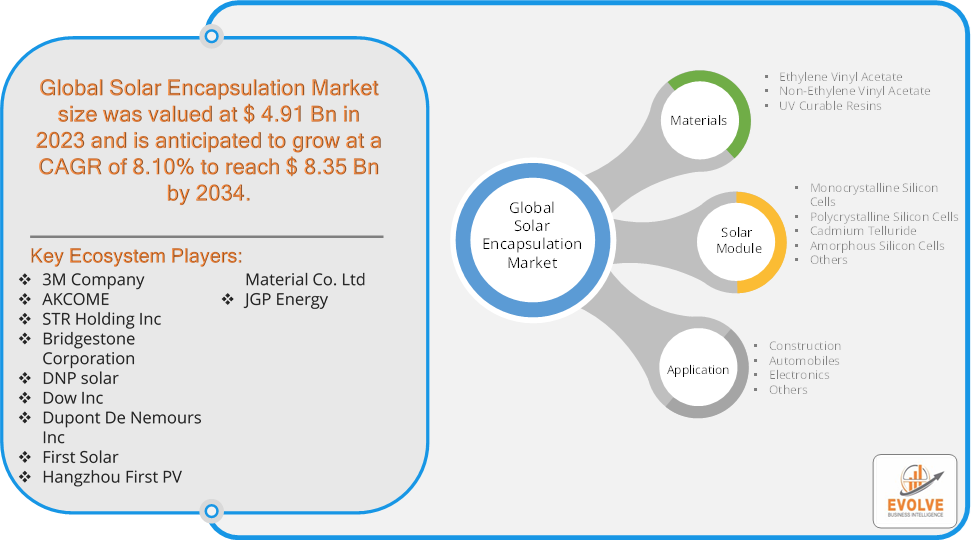Blog
Solar Encapsulation Market Grows: 8.10% CAGR

Evolve Business Intelligence has published a research report on the Global Solar Encapsulation Market, 2024–2034. The global Solar Encapsulation Market is projected to exhibit a CAGR of around 8.10% during the forecast period of 2024 to 2034.
Evolve Business Intelligence has recognized the following companies as the key players in the global Solar Encapsulation Market: 3M Company, AKCOME, STR Holding Inc, Bridgestone Corporation, DNP solar, Dow Inc, Dupont De Nemours Inc, First Solar, Hangzhou First PV Material Co. Ltd and JGP Energy.
The Global Solar Encapsulation Market is projected to be valued at USD 8.35 Billion by 2034, recording a CAGR of around 8.10% during the forecast period. The solar encapsulation market refers to the process of enclosing photovoltaic (PV) solar cells within protective materials to enhance their durability, performance, and longevity. It involves the use of various encapsulation materials, such as backsheets, encapsulants, and front sheets, to shield the solar cells from environmental factors and mechanical stress.
The market is driven by the increasing demand for renewable energy sources, particularly solar power, as well as technological advancements in solar PV modules. Encapsulation plays a crucial role in ensuring the long-term reliability and efficiency of solar power systems.
Download the full report now to discover market trends, opportunities, and strategies for success.
Segmental Analysis
The global Solar Encapsulation Market has been segmented based on Materials, Solar Module, Application.
Based on Materials, the Solar Encapsulation Market is segmented into Ethylene Vinyl Acetate, Non-Ethylene Vinyl Acetate and UV Curable Resins. The Ethylene Vinyl Acetate segment is anticipated to dominate the market.
Based on Solar Module, the global Solar Encapsulation Market has been divided into Monocrystalline Silicon Cells, Polycrystalline Silicon Cells, Cadmium Telluride, Amorphous Silicon Cells and Others. The Polycrystalline Silicon Cells segment is anticipated to dominate the market.
Based on Application, the global Solar Encapsulation Market has been divided into Construction, Automobiles, Electronics and Others. The Construction segment is anticipated to dominate the market.
Regional Analysis
The Solar Encapsulation Market is divided into five regions: North America, Europe, Asia-Pacific, South America, and the Middle East, & Africa. North America is important region for solar encapsulation. The region’s growth is driven by increasing environmental awareness, government support for renewable energy, and technological advancements in solar PV modules. Europe remains a significant market for solar encapsulation materials, with Germany, Spain, Italy, France, and the Netherlands being key contributors and the country is a leader in solar energy adoption, with strong government backing for renewable energy through policies such as the Energiewende (energy transition). This drives the need for durable and advanced encapsulation solutions. The Asia Pacific region holds the largest share of the global solar encapsulation market and the region’s growth is fueled by the rapid expansion of solar power installations, supported by favorable government policies and incentives. As the largest producer of solar panels, China is a significant driver of demand for encapsulation materials. The country’s government has set aggressive targets for renewable energy adoption, leading to massive solar PV installations. Countries in the Middle East, particularly the UAE and Saudi Arabia, are investing heavily in solar energy to diversify their energy portfolios away from oil and gas. The need for reliable encapsulation materials is crucial in this region due to the extreme heat and dust conditions and Africa has vast potential for solar energy, and countries like South Africa, Kenya, and Morocco are increasingly adopting solar projects to address energy shortages. Encapsulation materials that can withstand the harsh environmental conditions in many parts of Africa present opportunities for growth. In Latin America region, Brazil & Chile countries are experiencing rapid growth in solar installations, supported by government programs and favorable environmental conditions for solar power generation and Mexico has also been expanding its solar energy infrastructure, with growing demand for encapsulation materials to ensure the durability of solar panels in regions with high solar irradiance.



